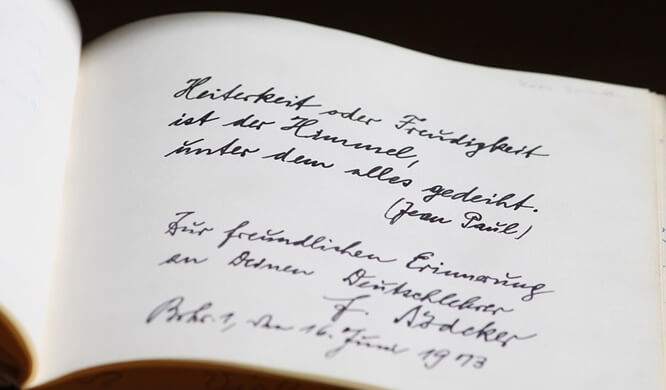Great poetry has the power to alter the way we see ourselves and the world. Poetry can immediately take you to a world full of awe, joy and wonder or deep sorrow and dread. Poetry shifts our thinking, through language into a bigger world that we may never have dared dream of. You will meet your own life in a great poem, have confirmed and clarified what you sense is true but had no words for. And all through the language we speak daily. Just in an order that surprises, whether in a rhythmic air, a steady beat, a rise-and-fall.

Here are just some of the best pieces of poetry that we have enjoyed. Entirely subjective in the selection, but an interesting read:
Emily Dickinson: Because I could not stop for Death
Dickinson takes an unusual tone toward death, the personification of death is lighthearted in her attitude who just passes by in a carriage and stops. Because I could not stop for Death, / He kindly stopped for me; / The carriage held but just ourselves / And Immortality
Oscar Wilde: To My Wife
This poem is a note from Wilde to his wife about his poems. He insists that in the depths of winter, his poem will remind his wife of the glorious summer and the love that he holds for her. And when wind and winter harden / All the loveless land, / It will whisper of the garden, / You will understand
T.S Eliot: The Hollow Men
Eliot shows where idealism leads, yet offers a way out of the emptiness, with nature, other people and God, all of which exist outside the hollow men. This is the way the world ends / not with a bang but a whimper
Sylvia Plath: Lady Lazarus
One of Plath’s most popular poems in which she compares herself to a cat with its nine lives, having survived three attempted suicides. The poem is also a revenge on the male ego: Out of the ash I rise / With my red hair / And I eat men like air
Wilfred Owen: Dulce et Decorum est
The powerlessness of men in the first world war, against the patriotic nationalism of those at home. The witnessing of the effects of a gas attack is described here, from the shock of the attack and the later suffering of those who survived. Bent double, like old beggars under sacks, / Knock-kneed, coughing like hags, we cursed through sludge, / Till on the haunting flares we turned our backs / And towards our distant rest began to trudge.
Neruda: Sonnet XVII
Conveying the total love one person can carry for another, how tragic and yet beautiful it can be, and the uniqueness of each individual person’s feelings. I love you as certain dark things are to be loved / in secret, between the shadow and the soul.
Margaret Atwood: Variation on the Word Sleep
More than a love poem, Atwood enters the conscious and the subconscious, exploring one person’s earnest desire to know another person to the very depths of their soul. I would like to be the air / that inhabits you for a moment / only. I would like to be that unnoticed / & that necessary
E. E. Cummings: the boys i mean are not refined
Whether about cannoniers in the first world war, with the girl the cannon, or provocative images of ignorance and sexual callousness, from the women and the men, this poem was banned from publication for years, making it an underground favourite. they speak whatever’s on their mind / they do whatever’s in their pants / the boys i mean are not refined / they shake the mountains when they dance
Walt Whitman: O Captain! My Captain!
Capturing the triumph and grief of the war’s end, “O Captain” is a public poem for a mass audience after the assassination of President Lincoln. Although the ship has weathered the storm and safely returned to harbour, the captain is dead. O Captain! my Captain! our fearful trip is done; / The ship has weather’d every rack, the prize we sought is won.
Allan Ginsberg: Howl
A poem that was shocking in the l950’s and early l960’s when it was written, and then a powerful. statement of what frustrated many in the l960’s and l970’s is now a sociological and psychological history of the last fifty years of America. I saw the best minds of my generation destroyed by madness, starving hysterical naked, / dragging themselves through the negro streets at dawn looking for an angry fix / angelheaded hipsters burning for the ancient heavenly connection to the starry dynamo in the machinery of night
Maya Angelou: I Know Why The Caged Bird Sings
A poem about whether the dream of freedom, can ever be possible. The answer is yes, in that to think it, leads to the first step from a cage, but is also no since society still holds prejudice against blacks, the poor, the vulnerable. Both weak and strong perish without having ended their song, their freedom, including Angelou’s friends Martin Luther King and Malcolm X. The caged bird sings with a fearful trill/ Of things unknown but longed for still/ And his tune is heard on the distant hill/ For the caged bird sings of freedom
William Butler Yeats: The Second Coming
One of the most evocative visionary lyric poems of the twentieth-century and widely praised for its technical excellence and extensive symbolic resonance. The blood-dimmed tide is loosed, and everywhere / The ceremony of innocence is drowned; / The best lack all conviction, while the worst / Are full of passionate intensity
William Shakespeare: Sonnet 116
One of the most quoted of all Shakespeare’s sonnets about love. Love is not love Which alters when it alteration finds, / Or bends with the remover to remove: / O no; it is an ever-fixed mark, / That looks on tempests, and is never shake
